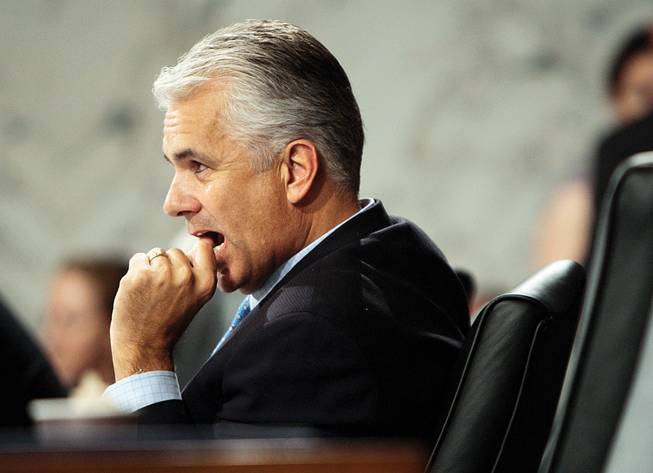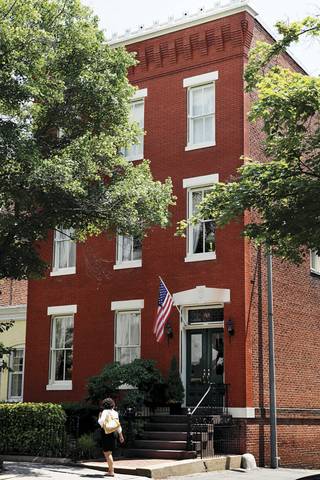
associated press file
Sen. John Ensign would not discuss his move with the Sun.
Sunday, Nov. 8, 2009 | 2 a.m.
Sun Topics
Sun Archives
- John Ensign mum on possible contact with feds (10-28-2009)
- Ensign likely in cross hairs of feds, ex-prosecutors say (10-8-2009)
- Outwardly, John Ensign is taking extra ethics scrutiny in stride (10-7-2009)
- Ethics group amends John Ensign complaints (10-6-2009)
- Talk show host calls for John Ensign’s resignation (10-5-2009)
- After new disclosures, word of John Ensign investigations emerges (10-3-2009)
Sen. John Ensign has moved out of the C Street house, the Christian home he shared with other elected officials on Capitol Hill that came under scrutiny for its residents’ beliefs and practices and their role in trying to end the Nevada Republican’s affair with a campaign staff member.
The red brick town house emerged this summer as the subject of political intrigue — not only as a pivotal location in Ensign’s affair with Cynthia Hampton, but also that of South Carolina Republican Gov. Mark Sanford, who sought guidance there as he wrestled with his own affair.
As fallout from Ensign’s affair continues with a preliminary Senate Ethics Committee investigation and talk of a possible criminal inquiry by the Justice Department, Ensign decided to move out, not wanting to draw further attention to his longtime home.
Ensign has previously said he did nothing legally wrong, and will cooperate with any formal investigations.
Ensign apparently was not pushed out, but left on his own. He apologized to his colleagues.
Ensign declined last week to discuss his housing situation, after The New York Times reported that the senator was planning to move.
“I don’t discuss my living arrangements,” Ensign told the Sun.
But the Sun confirmed through another source that he left the house a few weeks ago.
The break is significant. Ensign had lived at the C Street home since shortly after coming to Congress in 1995. (He left Congress for two years after an initial failed run for the Senate in 1998.)
As many six lawmakers — senators and congressmen — reside at the multistory town house just a few blocks from the Capitol. Group residences are common in Washington, where rents are high and elected officials typically support a residence in the capital and one in their home state.
A timely book, “The Family,” by religious writer Jeff Sharlet, described the organization that runs the house as a longtime, backroom power player in Washington, grooming lawmakers as spiritually chosen political leaders. Men often gather there for spiritual fellowship.
The C Street home became central to the Ensign saga when Cynthia Hampton’s husband, Doug, who was one of Ensign’s top aides at the time of the affair, arranged to confront Ensign there.
At that meeting in February 2008, one of the senator’s housemates and friends, Sen. Tom Coburn, R-Okla., urged Ensign to end the affair. (Other lawmakers who live at the home were not present.) During that meeting Ensign penned a letter to Cynthia calling off the affair, but immediately afterward phoned her and told her to ignore his note. The eight-month affair ended in August 2008, the senator’s office has said.
Last summer, Ensign disclosed the affair and a $96,000 payment his parents made to the Hampton family in spring 2008, around the time their employment ended with his offices.
By fall Ensign had resumed his regular Senate activities — he had a seat at the table during the health care debate, offering several amendments as a member of the Senate Finance Committee, and delivered floor speeches on various issues, including one last week on Lake Tahoe’s restoration.
But new allegations reported in The New York Times in October reignited the story. The Times reported that Ensign may have knowingly allowed Doug Hampton, in his new job consulting for Nevada companies, to lobby the senator’s office in possible violation of the one-year lobby ban for top staff members.
Ethics experts have said they expect the Justice Department will launch a criminal investigation of the matter, though the agency has declined to say whether an investigation is under way. The Senate Ethics Committee has confirmed it is conducting a preliminary investigation.
Coburn’s role was also more fully revealed in the Times story, which reported that Doug Hampton turned to him this year to seek help in obtaining financial restitution and relocation assistance from Ensign.
Doug Hampton sought $8.5 million from Ensign, a sum Coburn considered ridiculous. Hampton returned with a $2 million request, and Coburn brought it to Ensign, who flatly refused, the Times said.
Coburn acknowledged to the Times having met with Doug Hampton on business in possible violation of the one-year lobby ban, a meeting he had not realized was a potential problem until asked about it.
Sensing the ongoing scrutiny of his C Street home could continue, Ensign apparently decided to move on.

